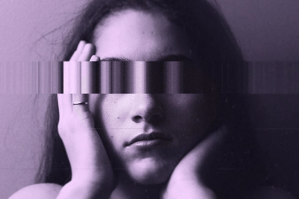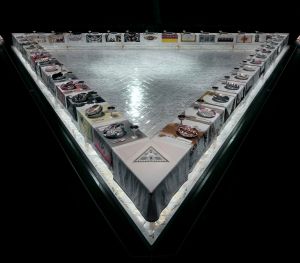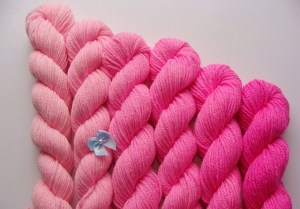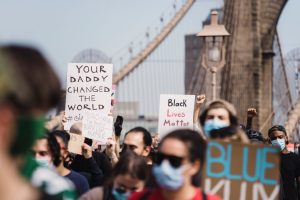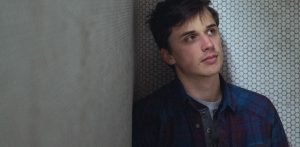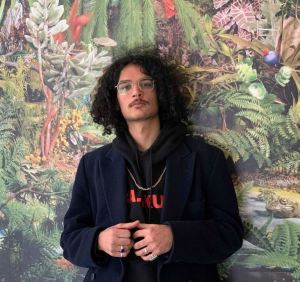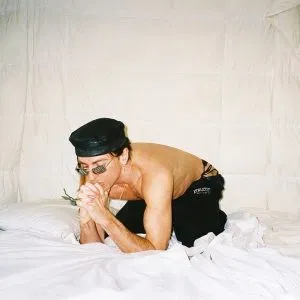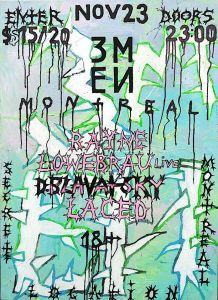Editor’s note: This interview was conducted in early March, before the coronavirus had shut everything down. Narcisse was slated to perform at the Blue Dog Motel on the 20th, but their show, along with all other live performances and concerts in Montreal, got cancelled. Follow Narcisse on Facebook for updates, and support your local artists!
For those attuned to the deep mess that self-awareness makes, life is liable to be turned inside out with a few of those “looking in the mirror on acid” moments—figurative or otherwise—where the face you take for granted every morning when you’re brushing your teeth, squinting like a geezer at that one weird hair, starts looking too much like what’s inside. “WAIT Wait waitwaitwait, is THAT…
Yep. Sure is. Some bumps and blemishes run way past the skin, are cosm(et)ic concerns you can’t solve with pads and clippers. Sooner or later, everyone has to wrestle with that heaving spiritual queasiness; how the person we wanted to be isn’t the person we are today, how the admirable parts of us got mangled by the abominable. It’s a tough affair, this whole shadow-work thing. Even tougher when you’re an artist, and you kinda deal in reflections and red herrings, when you’re always skating this close to questions of self-absorption and artifice. Stare at your own weird and warped image long enough and you’ll start asking that fun perennial question, “Who the hell am I?”
Well, the answer’s right there too. Literally staring you in the face. All that grit and glitter, that dark and light; the good, bad, beautiful, and ugly. Owning all of it is the first step. And who better to talk to about that first foray into narrative ownership than local electropop artist Narcisse (‘real’ name Marjouie Pedneault), formerly the folk singer Nature Moderne? Let’s figure out what the hell is in a name.
I was curious about your stage name, which obviously has its roots in the myth of Narcissus. Your work seems to have this very mythical relationship to identity and ego, to reaching for a transcendent ideal. Your partner’s stage name is Utopia, and your latest single is named “Icare.” What does mythologizing yourself mean to you?
I was confronted [by] my ego about one year ago, and how it reflected to me was a kind of thing to fight, because it gave me a lot of negative feelings and I was like, “Oh! I don’t want to feel that and I have the power to fight it.” So I kind of gained consciousness of my ego. And I don’t think that everybody does. So it was a big revelation to me, like there was this [inner] world that was making me feel so bad for so many years and now I could put a name on it. I saw a connection that could be made with social media and how we treat ourselves, how we show our entire lives to the world.
Was there a particular event that led to that revelation of ego?
I got into a polyamorous relationship and it really confronted me with my ego because I was feeling jealous but at the same time I really wanted the person to be loved, even if it’s not by me. I just wanted that person to be happy. So that’s where I was like it’s my ego that’s hurting, not me.
Your EP kind of feels like a concept EP, tracking the myth of Narcissus. It starts with the title track of course, then goes into “Trance_Formation” which kind of hints at finding clarity through confusion. Then there’s the song “Echo”, which shares its name with the nymph in the story. Were you consciously making the EP that way, telling the myth from start to finish?
I’m always a big fan of conceptual albums. When I was really young, I listened to a lot of albums that had stories in [them], like rock operas. For me, it really struck with “The Suburbs” by Arcade Fire. My world entirely changed and I wanted to make a story with music. So that’s how it all started. For me I cannot write an album if there’s not a concept or a story or characters behind it, things that mix with each other. It’s not just, “if you put these songs in that order, it sounds really nice.” There’s a purpose for everything.
We’ve already touched on topics of ego and the subconscious, and I can see in your music videos and performances that there’s this idea of bringing shadows to light, or balancing masculine and feminine energies. Do you find it difficult to bring all these very private psychological changes into the public sphere? That there’s a big risk of people thinking, “Oh they’re just being artsy,” or “Oh they’re just putting on a show?“
It’s not a constant fear but it’s kind of there. For us, we’re just being ourselves, completely ourselves. We’re being honest with who we are and we’re doing the show we want to do. But honestly there’s always the fear that some people might be offended or react really badly, because I really don’t wanna hurt anybody’s feelings when I’m performing. We know there’s a line, and we always get really really close to the line but we never go over it. We want to change the minding [sic] of certain people, people that are not really receptive to diversity. But I don’t really talk about it when I perform, I don’t talk about issues. We’re just ourselves, so we’re compromising on that aspect of gender and being active on the political scene.
Do you think that maybe your performances are actually in a weird way maybe more powerful if you don’t talk very explicitly and at length about these issues? I know there’s obviously, and for good reason, artists that will talk about gender and sexuality in between songs or they’ll make it a part of their mission statement. But maybe there’s a way to do it too where, like you said, you just go up really close to that line and you don’t talk about it but you just kind of prove it.
For me it’s showing to people that it’s a normal thing. Of course we’re ‘different’ from other bands but it shouldn’t be like something that’s making us different. Everything for me goes by education, and it’s like passive education, what we’re doing. There’s a message and behind that message, there’s a message. The message behind is important.
I was listening to some of your older work earlier and comparing it to now it’s obviously a day-and-night difference. How do you feel about your past work now that you’ve been performing as Narcisse for a year?
I feel like it’s an evolution. For me, at that point where I killed Nature Moderne and I changed it for Narcisse, it was obvious. As humans we change. 4 years ago I was listening to a lot of folk music and now I’m just listening to electro. So I couldn’t still make folk music because of what I wanna dance to.
You have to reflect yourself.
Yeah. And it’s just normal, and I didn’t want to erase that part because I’m proud of what I’ve accomplished as that project and where it got me and every single person I met through it. It’s kinda funny because the last show I did as Nature Moderne was a funeral. It was the last time I played all of these songs and I was really emotional because I was like, “Okay, I kinda liked it,” you know? But it’s fine. As humans we evolve, and you gotta follow the road.
Like you said, we gotta follow the road so I won’t backtrack too much, but what do you think is the biggest difference between your artistry as Nature Moderne and Narcisse? Beyond just genre. Maybe the way you related to the music, or your creative process.
Everything changed when I realized that to improve, you gotta get out of your comfort zone. With Nature Moderne, I was really in my comfort zone, I was behind so many instruments at the same time that I [felt] like I was in a cage. With Narcisse it was like I’m setting myself free, but at the same time I’m putting myself into situations where I’m completely terrified. And that helps a lot. Recently I watched the first show we did with Narcisse and it’s another planet. Putting myself out of the comfort zone is the biggest difference between the two projects.
What are some of the things that terrify you as Narcisse, that are out of your comfort zone?
I think one of the first things was the first music video. I don’t know if you watched it but at the end I was making out hard with a girl.
Yeah I pretty much watched every video on the channel.
Well, thank you. I was really really stressed about that particular scene ‘cuz I was like, “I’m not an actress! I’ve never done this before, I don’t know that person.”
Oh so it wasn’t like a friend or a-
No I contacted the agency and I like-
You just made a phone call and you were like, “I need someone to kiss for a video. Can you please send someone?“
It’s funny because I saw that actress on a Quebec show about a transgender person, and I wanted to work with people who are around that community, and I was like, okay this is it. And [shooting the scene] was fucking terrifying.
For what it’s worth, you seemed pretty comfortable in that video to me.
[That’s] a good thing, ‘cuz inside I was like, screaming. But at the end of the day I was like, “Okay I did that. Now what?” I was taking a step higher on the ladder. And the other thing that really helped me with getting out of my comfort zone was that, in my shows, I really wanted to get down and get right in front of people and sing to them. It’s really important that I look into everybody’s eyes ‘cuz that’s how you make a connection and that’s what I was really afraid of doing as Nature Moderne and now I’m like, “I’m gonna look every single person in the eye at least one time during the show.”
I wasn’t able to attend your Le Francouvertes performance but I did come across the 10 Absurd Questions Q&A you did for them. What interested me was your answer to the 2nd question, “If you only had to choose one sentence from one of your songs to convince the judges, repeating it on different rhythms, what would it be?” And you chose the line, “I can’t write anymore.” If anything, it seems like you’re being very productive, performing regularly, putting out new music. Why’d you land on that line?
I knew that everyone was gonna put their best line, so I chose that line for irony. Like, I can’t write any more, I won’t impress you with my lyrics. I’ve already written all that I have to hear.
On the topic of writing—are you gonna consciously keep going down the road of incorporating mythology into your narrative?
When I was a kid I had this video game about [ancient] Greek culture and society, and I was really into that game for some reason, I don’t know why. I’m still influenced by that today. It’s really interesting to me how these stories are so old but they still resonate for us today. These universal stories, universal lessons. So to take these stories and rewrite them in a more modern and open way is almost like education in a way.
Let’s close with a question about you and your story then, Narcisse. What’s the universal story that you’re trying to get across to people? What’s the one thing you want most to passively educate people about?
I used to begin my early shows by saying that people who love themselves for who they are don’t go out and hurt other people. I want people to remember that if they love themselves completely—and for real, not just for show—they’ll be so much happier and maybe they won’t be negative anymore. So it’s about energy, what you show, how you grow into the world. If you love yourself, it’s gonna be way better.

